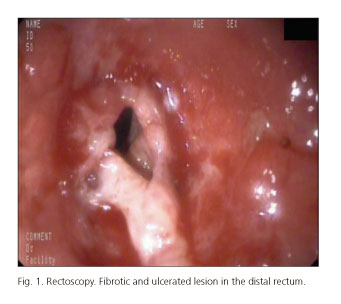Meu SciELO
Serviços Personalizados
Journal
Artigo
Indicadores
-
 Citado por SciELO
Citado por SciELO -
 Acessos
Acessos
Links relacionados
-
 Citado por Google
Citado por Google -
 Similares em
SciELO
Similares em
SciELO -
 Similares em Google
Similares em Google
Compartilhar
Revista Española de Enfermedades Digestivas
versão impressa ISSN 1130-0108
Rev. esp. enferm. dig. vol.109 no.9 Madrid Set. 2017
https://dx.doi.org/10.17235/reed.2017.4917/2017
LETTERS TO THE EDITOR
Rectal inflammatory stenosis secondary to Chlamydia trachomatis: a case report
Estenosis rectal inflamatoria secundaria a Chlamydia trachomatis: a propósito de un caso
Key words: Chlamydia trachomatis. Lymphogranuloma venereum. Proctitis. Rectal stenosis.
Palabras clave: Chlamydia trachomatis. Linfogranuloma venéreo. Proctitis. Estenosis rectal.
Dear Editor,
Lymphogranuloma venereum (LGV) is a sexually transmitted infection caused by Chlamydia trachomatiswith an increasing incidence (1). The treatment is medical, except in refractory or complicated cases.
Case report
We present the case of a 30-year-old man with a history of HIV with suspected proctitis who underwent a colonoscopy where a pathological mucosa with purulent exudate in the rectosigma was found. Malignancy was ruled out and the microbiological analysis of the stool was positive for the herpes simplex virus type 2 and Chlamydia trachomatis. The patient was treated with valganciclovir and azithromycin, and showed an improvement of the clinical infectious disease but suffered progressive constipation. A new rectoscopy showed a fibrotic and ulcerated lesion in the distal rectum (Fig. 1). The biopsy and microbiological analysis were negative. Due to the persistence of the symptoms with conservative treatment, an ultra-low anterior rectum resection with coloanal reservoir and ileostomy was performed. After a complicated postoperative period, the bowel transit was reconstructed without complications. The immunohistochemical study was also negative. The patient is currently in follow-up with no reported complications.
Discussion
The LGV is an emerging public health problem in Europe in recent years, mainly in men who have sexual intercourse with other men and patients with HIV (1,2). Cases tend to be mild although complications such as fistulas or stenosis may occur (3). Medical treatment is the first option, and in refractory or complicated cases surgery is a good option.
Luis Eduardo Pérez-Sánchez, Moisés Hernández-Barroso and Guillermo Hernández-Hernández
Department of General and Digestive Surgery.
Hospital Nuestra Señora de Candelaria. Santa Cruz de Tenerife, Spain
References
1. López-Vicente J, Rodríguez-Alcalde D, Hernández-Villalba L, et al. Proctitis as the clinical presentation of lymphogranuloma venereum, a re-emerging disease in developed countries. Rev Esp Enferm Dig 2014;106:59-62. DOI: 10.4321/S1130-0108201400010001. [ Links ]
2. Cabello Úbeda A, Fernández Roblas R, García Delgado R, et al. Anorectal lymphogranuloma venereum in Madrid: A persistent emerging problem in men who have sex with men. Sex Transm Dis 2016;43:414-9. DOI: 10.1097/OLQ.0000000000000459. [ Links ]
3. Pinsk I, Saloojee N, Friedlich M. Lymphogranuloma venereum as a cause of rectal stricture. Can J Surg 2007;50:31-2. [ Links ]











 texto em
texto em 


